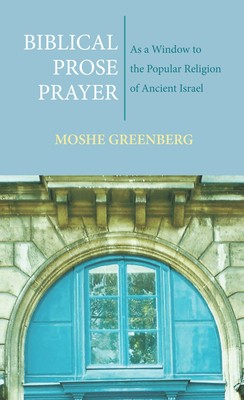
- We will send in 10–14 business days.
- Author: Moshe Greenberg
- Publisher: Wipf & Stock Publishers
- Year: 2008
- Pages: 78
- ISBN-10: 1556351119
- ISBN-13: 9781556351112
- Format: 12.5 x 19.6 x 0.8 cm, softcover
- Language: English
- SAVE -10% with code: EXTRA
Reviews
Description
Some degree of spiritual enlightenment must be supposed to account for the overall tolerance, even receptivity, of the people; though they refused to comply with the prophets' uncompromising demands, and occasionally persecuted one or another of them, as a rule they allowed them to preach, and even spawned devotees who reverently preserved their speeches until canonization. Unsupported by power and wealth, the classical prophets can have persisted for centuries only because they were rooted in loamy spiritual soil. The populace constituting that soil deserves to be appreciated no less than the exotic flowers that towered above it. What was the spiritual loam that prepared Israel's soil so that prophecy could thrive in it? Any answer to this question must give due consideration to the popular life of prayer. For it was in extemporized praying that the Israelites experienced a nonmagical approach to God in which form was subordinate to content; here, in immediate contact with a God who ""searched the conscience and the heart,"" they were sensitized to sincerity in self-disclosure to God; and, finally, it was in prayer that they had constantly to face the issue of adjusting their ways to God's in order to obtain his favor. Greenberg finds in this rich life of private prayer a setting for the high religious ideas--and the scathing critique of worship--which characterized the ""genius"" of the prophets of the eighth and ninth centuries BC. This masterful evaluation of biblical prose prayer, a tradition independent of experts and special places, suggests an explanation for the unprecedented democratization of worship in postbiblical Judaism. Moshe Greenberg is Emeritus Professor of Bible at the Hebrew University in Jerusalem. Prior to teaching at the Hebrew University, he taught courses in Bible and Judaica at the Univerity of Pennsylvania, Swarthmore College, the Jewish Theological Seminary of America, and the University of California at Berkeley.
- Author: Moshe Greenberg
- Publisher: Wipf & Stock Publishers
- Year: 2008
- Pages: 78
- ISBN-10: 1556351119
- ISBN-13: 9781556351112
- Format: 12.5 x 19.6 x 0.8 cm, softcover
- Language: English English
Some degree of spiritual enlightenment must be supposed to account for the overall tolerance, even receptivity, of the people; though they refused to comply with the prophets' uncompromising demands, and occasionally persecuted one or another of them, as a rule they allowed them to preach, and even spawned devotees who reverently preserved their speeches until canonization. Unsupported by power and wealth, the classical prophets can have persisted for centuries only because they were rooted in loamy spiritual soil. The populace constituting that soil deserves to be appreciated no less than the exotic flowers that towered above it. What was the spiritual loam that prepared Israel's soil so that prophecy could thrive in it? Any answer to this question must give due consideration to the popular life of prayer. For it was in extemporized praying that the Israelites experienced a nonmagical approach to God in which form was subordinate to content; here, in immediate contact with a God who ""searched the conscience and the heart,"" they were sensitized to sincerity in self-disclosure to God; and, finally, it was in prayer that they had constantly to face the issue of adjusting their ways to God's in order to obtain his favor. Greenberg finds in this rich life of private prayer a setting for the high religious ideas--and the scathing critique of worship--which characterized the ""genius"" of the prophets of the eighth and ninth centuries BC. This masterful evaluation of biblical prose prayer, a tradition independent of experts and special places, suggests an explanation for the unprecedented democratization of worship in postbiblical Judaism. Moshe Greenberg is Emeritus Professor of Bible at the Hebrew University in Jerusalem. Prior to teaching at the Hebrew University, he taught courses in Bible and Judaica at the Univerity of Pennsylvania, Swarthmore College, the Jewish Theological Seminary of America, and the University of California at Berkeley.


Reviews